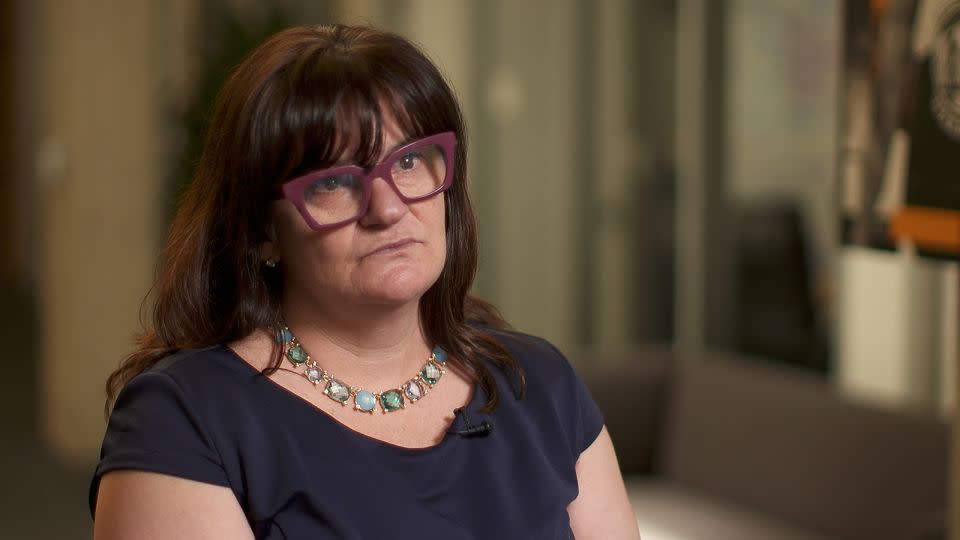Editor’s note: If you or someone you know is struggling with suicidal thoughts or mental health matters, please call the 988 Suicide & Crisis Lifeline in the US by dialing 988 to connect with a trained counselor, or visit the 988 Lifeline website. For support outside of the US, a worldwide directory of resources and international hotlines is provided by the International Association for Suicide Prevention. You can also turn to Befrienders Worldwide.
Sitting at the kitchen table, Matt struggles to recount the events of the past few months. “As soon as I found out that it was a suicide, I was 100% sure that it was the scam,” he says.
“Our father was, from the day I was born until six months ago, always a positive, happy person. This was literally the only thing in his life that had happened, to where it changed him, and it just crushed him.”
On a horse farm in northern Virginia, surrounded by sprawling fields and stables, the family gathers at their younger sister Adrianne’s house - something they’ve done a lot in the three months since their father took his own life after falling victim to a so-called “pig butchering” scam.

The scams – mostly run out of Southeast Asia - are given that name because they involve “fattening up” victims before taking everything they have. The con artists behind them take on false online identities and spend months financially grooming their victims to get them to invest on fraudulent cryptocurrency websites.
Dennis Jones, an avid runner and photographer, was adored by his children and grandchildren. Described as “a bit of an activist” by his family, the 82-year-old spent much of his retirement working with refugees and debating politics online. But in the last few months of his life he withdrew from his family and, having been divorced for years, befriended a woman going by the name Jessie on Facebook.
The two had been talking online for months and built a close relationship. Eventually, Jessie convinced Dennis to invest in crypto.
Dennis complied. Without ever meeting Jessie in person, he spent everything he had, and when he had nothing left, she demanded more. Until one day the money disappeared, leaving him in ruin.
In early March, Dennis’ children scheduled a meeting to help their father get back on his feet after the scam. The plan was for him to move in with Adrianne and her family. “We wanted him to know that he was going to be taken care of,” Matt said.
But the morning of the meeting none of them could reach Dennis. Matt drove to Dennis’s apartment but he wasn’t home, and all calls went straight to voicemail. They figured he must be out on one of his long runs. An hour later, police knocked on Matt’s door to inform him that Dennis had taken his own life.
Dennis was one of countless victims of a massive global criminal operation predominantly run by Chinese gangs who have built a multibillion-dollar scam industry in Southeast Asia. There, they’ve assembled an army of scammers, many held against their will in guarded compounds and forced to con people all around the world out of their life savings.
It’s theft at a scale so large that investigators are now calling it a mass transfer of wealth from middle-class Americans to criminal gangs. Last year, the FBI estimates, pig butchering scams stole nearly $4 billion from tens of thousands of American victims, a 53% increase from the year before.
While the crime takes place online, its real-world consequences are devastating. Law enforcement sources predict that losses will continue to grow in the next year, and as the criminals remain out of reach, money and lives will continue to be lost.
‘Victims victimizing victims’
Santa Clara county prosecutor Erin West has dedicated the last few years to fighting pig butchering scams. “I’ve been a prosecutor for over 25 years, I’ve done all kinds of different types of crime. I spent nine years in sexual assault. And I’ve never seen the absolute decimation of people that I’ve seen as a result of pig butchering,” she says.
Being in the heart of the tech industry in California’s Bay Area, Erin and her team were some of the first to begin investigating pig butchering scams. “We’ve got victims victimizing victims and the only winners are Chinese gangsters,” she says.
Shawn Bradstreet, US special agent in charge of the San Francisco field office, told CNN that some of the money stolen from American victims is spent on expanding the scam operations and the massive compounds that house them and other illicit activities.

West and Bradstreet are part of a small group of US law enforcement agencies working to find ways to tackle a crime that largely takes place online and overseas.
Social media is flooded with scammers hunting for victims, on WhatsApp, Facebook, LinkedIn and, increasingly, dating apps such as Bumble and Tinder.
“The unfortunate reality is that scammers may pull on the heartstrings on those looking for love or connection - on dating apps and on all online platforms,” a spokesman for Match group, which owns Tinder, said in a statement.
Both Match and Facebook and Whatsapp parent company Meta told CNN they are working to prevent scammers from using their platforms, by flagging suspicious language and educating their users. CNN has reached out to LinkedIn and Bumble for comment.
In May, a group of tech companies including cryptocurrency exchange platform Coinbase, Meta, Match group and the anti-scam charity organization GASO announced the “Tech Against Scams Coalition,” acknowledging that scams “are a pervasive issue across the entire tech landscape.”
But West says that’s not enough. She recently set up a task force called Operation Shamrock to bring together law enforcement, social media, crypto exchanges and traditional banks to tackle crypto scams.
A 2023 CNN investigation revealed that many of the scammers are themselves victims of human trafficking. Lured to Southeast Asia with promises of white-collar jobs, they are instead trafficked into Myanmar, Cambodia, Laos and other destinations. Since a 2021 military coup, Myanmar has become Asia’s scam capital where criminals can operate freely under the cover of a bloody civil war.
Today, city-sized compounds loom over the Myanmar side of the border with Thailand, with nothing but a dried-out river separating the two countries. Inside are what can only be described as scam factories — offices full of hundreds of slaves, working 16-hour days to befriend victims and convince them to invest in cryptocurrency on fake platforms that mimic legitimate crypto exchanges.
Those kept inside tell stories of torture and abuse, of scammers who don’t bring in enough money being beaten with electrical sticks and forced to do hundreds of squats as punishment.
Rakesh, an Indian national, was trafficked to a compound called Gate 25 in Myanmar after applying for an IT job in Thailand in late 2022. There he signed a scamming contract under threat of execution, and was trained to scam.
For 11 months he posed as “Klara Semonov,” a Russian investor based in Salt Lake City. To avoid gruesome punishments inflicted by his captors, he said he sent romantic messages to victims like Dennis to convince them to invest their money. “Seventy to 80% fall for fake love,” he said.
Rakesh was eventually released in 2023 when his contract ended. He believes he was let go because he simply wasn’t good enough at scamming. “They (were) treating us like slaves,” he told CNN days after his release in 2023.
Conveniently located on the border, the compounds use telecoms services from the Thai side. In November 2023 Thai Justice Minister Tawee Sodsong said they were working to cut off the compounds.
Pachara Naripthaphan of the Thai National Broadcasting Transmissions Commission has since told CNN that in May they instructed all telecom operators to shut off wireless services in proximity to any areas bordering Myanmar, Laos or Cambodia. Despite that, their data shows that illicit activity has continued at a baseline level as criminals adjust to using other means of connecting to the internet such as Starlink.
Even here on the border, where the physical distance is reduced to nothing but a narrow river, the criminals remain out of the reach of law enforcement, either locally or internationally.
“Many of these perpetrators are beyond my reach. And in order to establish deterrence, we need to prosecute some individuals who are running these operations in Southeast Asia,” Santa Clara district attorney Jeff Rosen says.
According to FBI data, out of nearly $5 billion dollars lost to cryptocurrency fraud in 2023, $3.96 billion was stolen in pig butchering scams. While Rosen’s office and the Secret Service have had some success in retrieving millions of dollars in stolen funds, no American law enforcement agency has been able to arrest a single suspected scammer.
‘Hard to believe’
Carina, who asked CNN to only use her first name, met “Evan” on Bumble in May 2023. His photos showed a blond man with piercing blue eyes. He claimed to be Dutch and showed off his wealth — expensive cars and Rolexes, though none of that appealed to Carina, a chemistry PhD and triathlete.
Their relationship moved fast. Right away he suggested they move their conversation to WhatsApp and delete the Bumble app to focus on getting to know each other. A few days later he started calling her “honey.”
“We’re doing that already?” Carina asked, in a text conversation seen by CNN.

Evan claimed he had made his money running a company with his uncle and investing in crypto. He told her she could pay off her student loans in a matter of months by investing. Carina was hesitant at first but eventually agreed to put in $1,000.
He told her not to use the official app of the Kraken crypto platform, and instead sent her a link to a parallel website which they used to trade in the coming months.
As their investments grew, so did their relationship. The two made plans for the future, romantic weekend getaways and family introductions, though they were yet to meet in person. “I’ve never met anyone like you before. Hard to believe I’m falling for a man I have never seen or spoken to,” Carina told him just a few weeks in.
The first red flag emerged when Evan pressured Carina to enter an “event” where she would have to invest $150,000 by the end of July to make extra profit. If she failed to reach the target, her account and money would be frozen.
Scared to lose the money she had already put in, Carina panicked. She took out a high-interest loan and borrowed money from friends and family to meet the deadline.
Despite all his purported wealth, Evan refused to help her, instead lying and telling her he was struggling to meet his target of $500,000 and needed her help, she said. At one point, Carina found herself consoling her scammer, telling him the money didn’t matter as long as they loved each other.
‘Major psychological stunt’
After Dennis took his life, his adult children were left piecing together what happened by going through his Facebook messages. There, they learned for the first time what Dennis had been dealing with.
“I have been having dark thoughts about my life and it being over. Certainly it looks like my financial life is done,” Dennis messaged his scammer in the months before his death. “And the ultimate pain here is that I have betrayed family trust. This is unbearable,” he writes in screenshots of their conversation seen by CNN.
“What’s most heartbreaking is reading through these messages. He was talking about having signs of a nervous breakdown. And so these were all shared with the profile,” Adrianne says.
“Instead of sharing with us,” Matt adds.
“What’s amazing here is that these scammers overseas have figured out a way that they can get victims to trust them over their own families,” West says. “It’s a major psychological stunt that they’re pulling on the rest of the world.”
Carina didn’t tell her family about what had happened and the stress she was under until the very final moment. After hitting their event targets, Carina tried to withdraw some of her money, but was unable to do so, having violated platform rules by investing in the same account as Evan. After months of hiding it, Carina told her family, who suggested she speak to Kraken directly.
The next morning she called Kraken customer services, who informed her there was no account under her name.
“I realized I had been scammed at that point. And I broke down,” Carina says. “It was all fake. It was a fake profile. It was a fake story. The amount of time that he spent grooming and getting to know me was incessant.”
Reading through their conversations a year later, Carina barely recognizes herself. “It’s actually heartbreaking for me to see the state that I was in,” she says.
The emotional and financial entanglement had taken a toll on her, and she was left reeling from a breakup and bankruptcy at the same time.
In the aftermath, Carina had to move back in with her mother. It will take her at least a decade to repay her debts.
‘Playing on emotions’
Their grief still raw, Adrianne and Matt are only now starting to understand what happened to their father.
“He wasn’t up against one person. It’s a multibillion-dollar criminal organization with a playbook that’s playing on the emotions … It was almost like he was brainwashed to some extent,” Dennis’ daughter Adrianne says.
As the criminals’ tactics continue to evolve and law enforcement struggles to find a way to stop them, there will be more victims in 2024, and more people like Matt and Adrianne, who suffer a loss far greater than money.
“He died embarrassed, ashamed, financially devastated, heartbroken. And if sharing our story helps somebody else or another family, then it’s worth it,” Adrianne says.
If you think you are a victim of a cyber scam the FBI recommends you report to the Internet Crime Complaint Center (IC3) at https://www.ic3.gov/Home/ComplaintChoice
For more CNN news and newsletters create an account at CNN.com
https://news.google.com/rss/articles/CBMiRWh0dHBzOi8vc2cubmV3cy55YWhvby5jb20va2lsbGVkLXNjYW0tZmF0aGVyLXRvb2stbGlmZS0xNjAwMTYzNDcuaHRtbNIBAA?oc=5
2024-06-18 01:15:04Z
CBMiRWh0dHBzOi8vc2cubmV3cy55YWhvby5jb20va2lsbGVkLXNjYW0tZmF0aGVyLXRvb2stbGlmZS0xNjAwMTYzNDcuaHRtbNIBAA
Tidak ada komentar:
Posting Komentar